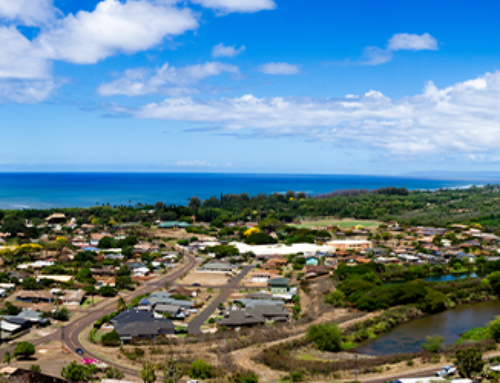Have you ever found yourself at the airport in Hawaiʻi, heart-sick about getting on the plane? If so, you’ve probably daydreamed about staying and making Hawaiʻi your home.
Ready to take that dream further—and buy a home in Hawaiʻi? Becoming a homeowner in Hawaiʻi can be a little different than other places, including the mainland.
In this article, we’ll walk you through exactly what you need to know. We’ll also show you how to make your dollar go a little further in Hawaiʻi, offer you some help choosing the right island for you, and help you set yourself up for home-buying success.
Let’s start with the big question: How much does it cost to own a slice of paradise in Hawaiʻi?
Step 1: Do Your Research and Set Your Budget
If you’re coming from a low cost of living area, you might be surprised at the price (and popularity!) of real estate in Hawaiʻi:
Keep in mind, though, that prices vary from island to island, neighborhood to neighborhood, and property to property.
Which Hawaiian Island Has the Most Expensive Real Estate?
Maui has the most expensive real estate in the Hawaiian Islands. In the past, Kauaʻi has been the most expensive, both in terms of buying a house or a condominium. However, Maui recently eclipsed Kauai to become the most expensive island in Hawaiʻi for purchasing real estate.
Average Hawaiʻi Home Values
(Source: Zillow.com)
As you can see from the numbers above, Oʻahu is the third-most expensive island for real estate, followed by the Big Island.
To get a sense of exactly what properties are going for on each island, you can browse the Hawaiʻi MLS listings. From there, you’ll start to figure out the budget you’ll need for the kind of home you’re interested in.
What Neighborhoods Have the Fastest-Growing Sale Prices in Hawaiʻi?
According to Redfin, the five areas with the fastest growing sale prices are:
- Wailuku, Maui
- Kīhei, Maui
- East Honolulu, Oʻahu
- Lahaina, Maui
- Hilo, Big Island
The pandemic produced a pretty significant home-buying boom in Hawaiʻi. Although the market has cooled slightly, homes in Hawaiʻi are still in high demand. The areas above saw a particularly big bump in recent sale prices.
What Are the Most Expensive Neighborhoods in Hawaiʻi?
Recent data from Zillow has revealed the most expensive neighborhoods across the Hawaiian Islands:
- Hanalei, Kauaʻi
- Puakō, Big Island
- Haleʻiwa, Oʻahu
- Kailua, Oʻahu
- Lāʻie, Oʻahu
- Haʻikū, Maui
- Kīlauea, Kauaʻi
- Hāwī, Hilo
- Pāʻia, Maui
- Makawao, Maui
As you can see, each island has its share of expensive real estate. Prices will vary from property to property, but this list will give you a sense of the prevailing trends.
Which Hawaiian Island Has the Cheapest Real Estate?
You’ll find the lowest prices for Hawaiʻi houses and condos on the Big Island. For the next-lowest prices, look for real estate on Oʻahu.
Putting a Final Budget Together
Finally, remember to account for those “extra” costs above and beyond your mortgage payment, including:
- Homeowners’ association fees/condo fees
• Closing costs
• Property taxes
• Homeowner’s insurance or condo insurance - Private mortgage insurance (PMI)
Once you take the current market value of comparable properties into account—plus these costs—you’ll arrive at your final budget. This is a key piece of information you’ll want to pass on to your real estate agent in Hawaiʻi.
Since Hawaiʻi real estate isn’t cheap, you might be interested in a few ways to save a few dollars—or bring a few more in. We’ll cover those next.
Step 2: Know How to Make Your Dollar Go Further in Hawaiʻi
Property Tax Exemptions
If you plan to occupy your new home as your primary residence, you may be eligible for a break on your property taxes.
In Hawaiʻi, property tax is regulated at the county level, so you’ll need to examine your chosen county’s regulations to determine what kind of exemptions you’ll be eligible for. Below, you’ll find a brief overview:
- The City and County of Honolulu offers exemptions for homeowners who occupy their home for more than 270 days a year. Additional exemptions are available for residents 65+, totally disabled veterans, those with Hansen’s disease, and those who are blind, deaf, or totally disabled.
- Maui County offers tax relief for owners who occupy their home for more than 270 days a year. Other exemptions are available for disabled veterans, active duty deployed military, those with Hansen’s disease, individuals with impaired sight or hearing, disabled residents, kuleana land, and more.
- Hawaiʻi County also offers exemptions for homeowners occupying their property as a principal home for more than 200 calendar days per year. The exemption grows for residents 60+ and 70+. Exemptions are also available for disabled residents, veterans, and kuleana
- Kauaʻi County offers exemptions for homeowners who occupy their property as their principle home for more than 271 calendar days per year. Additional exemptions are available for lower-income owners, totally disabled veterans, those with Hansen’s disease, and those who are blind, deaf, or totally disabled.
If you’re still deciding which island is right for you (more on that next!), the available property tax benefits may help in making a decision.
Renewable Energy Tax Credits
Energy costs are high in Hawaiʻi—the highest in the nation, in fact. As a result, if you choose a home with a solar panel system, it may offer you a break on your electricity bill.
Additionally, installing solar panels can come with a number of significant tax credits:
- The Energy Efficient Home Improvement Credit offers tax credits for up to 30% of qualified expenses related to energy-efficient improvements, including solar. You can claim the maximum annual limit ($3,200) every year that you make eligible improvements through 2033.
- The Hawaiʻi state Renewable Energy Technologies Income Tax Credit (RETITC) offers a 35% state solar tax credit up to a maximum of $5,000. Total output capacity requirements apply.
- Those living in the City & County of Honolulu can take advantage of tax exemptions for alternate energy improvements.
With plenty of sunshine in Hawaiʻi—and plenty of benefits to your finances—installing solar panels can be a big win-win for you.
Rental Income
Finally, some people purchase real estate in Hawaiʻi with the intention of renting some or all of their property. Although this can be a smart way to offset the cost of a mortgage, there are a couple of things you need to know.
Short-term rentals are a hot-button issue in Hawaiʻi. They’re regulated differently (and carefully!) in each county. If you’re thinking of buying a property to list on Airbnb or Vrbo, make sure you discuss what’s possible with your real estate agent. Short-term rentals—usually anything less than six months—outside of designated areas may have to go through a permitting process.
Long-term rentals are also an option. Both Kauaʻi and Maui Counties offer some property tax breaks for landlords with one-year (or longer) leases with tenants. To incentivize affordable rentals, Kauaʻi does require that rental rates adhere to specific guidelines in order to qualify for the tax break. Talk with your real estate agent for more specific information related to your county and your location.
And while we’re on the topic of location…
Step 3: Figure Out Which Island Is Right for You
You may already know the answer to this question. After all, each one of Hawaiʻi’s four major islands has its own character, atmosphere, and vibe. If you’ve spent time in the Aloha State, you may know which island fits your vision of Hawaiʻi life. If that’s the case, you can skip ahead to the next step.
However, if you’re not sure which island is right for you, check out our article: What’s the Best Hawaiian Island to Live On, and Why? We’ll give you the run-down on Oʻahu, the Big Island, Maui, and Kauaʻi so you can narrow your focus to the island that you’ll soon call home.
Which Neighborhood Is Right for You?
Once you figure out which island you’ll call home, you’ll then need to figure out which neighborhood you’ll want to settle in.
We’ll give you a head start on your research with our local guides:
- The Insider’s Guide to Oʻahu: Where to live, where to shop, and where to work on the Gathering Place
- The Insider’s Guide to Honolulu: Neighborhoods to explore and adventures to enjoy in Hawaiʻi’s biggest “city”
- The Insider’s Guide to Maui: Where to live, shop, and work on the Valley Isle
- Kauaʻi Neighborhood Guide: An in-depth look at the best places to live on the Garden Isle
- The Insider’s Guide to Kona: Where to live on the dry, sunny side of the Big Island
- The Insider’s Guide to Hilo: The best places to live on the lush, tropical side of the Big Island
Once you’ve figured out which island is right for you, it’s time to make some decisions.
Step 4: Decide What You Want for Your Hawaiʻi Home
You’ll find a diverse range of housing types in Hawaiʻi—condos on the beach, multi-dwelling estates on acres of land, luxury homes with private pools, single-family homes in tightly-knit neighborhoods, and more.
In order to start narrowing your search, get clear on your must-haves and your nice-to-haves for your ideal home. This will help your Hawaiʻi real estate agent pick out the right listings and avoid wasting your time on properties that will never work.
For example, are you looking for:
- A condo that means little to no outdoor upkeep for you?
- A big house that can accommodate a family—and maybe even an extended family? Or a house with plenty of room for out-of-state visitors?
- Something that’s move-in ready? Or a fixer-upper that you can customize exactly how you want it?
- A private, quiet community or a vibrant, family-friendly one?
- Easy proximity to stores, restaurants, and bars or a more remote, serene setting?
- A house with an ʻohana unit, either for one of your in-laws or to rent to a tenant? (What’s an o’hana unit?)
Tip: Stay Flexible
Once you divide your thinking into musts and wants, try to stay flexible. The perfect property may not exist on your island—or in the neighborhood where you want to live. By focusing on the musts and being more adaptable with your wants, you’ll likely find a property you like more quickly. (And, with a little renovation, your house or condo may quickly become the house that meets both your musts and your wants!)
Buying a Condo in Hawaiʻi
If you’re looking for that maintenance-free, amenity-rich lifestyle in Hawaiʻi, you may be looking at buying a condo.
Although condos come with a significant number of perks, they also mean becoming part of a community with its own set of rules. Buying a condo also means making a commitment to the entire property, including its upkeep and maintenance.
Before you commit to a Hawaiʻi condo:
- Get clear on whether the condo is a leasehold or a fee-simple property. Read more about leasehold properties in Hawaiʻi.
- Review the rules associated with the community and make sure you feel comfortable with them. This includes any restrictions on any pets.
- Take a close look at the maintenance fees and financials of the property. Do the maintenance fees feel appropriate? Or have they been kept artificially low while the condo board defers vital maintenance? What does the reserve fund look like, and are there any big-ticket repairs coming up? Doing your due diligence in this area will prevent any surprises in terms of assessments or increased maintenance fees in the future.
- Understand how much condo insurance will cost you for the unit you’re looking at so you can get an accurate picture of your budget.
Once you do this research, you’ll have a much clearer vision for the perfect Hawaiʻi condo situation for you.
Homeowners’ Associations (HOAs)
Certain residential communities in Hawaiʻi involve joining a homeowners’ association (HOA). In exchange for monthly or annual dues, the HOA maintains community amenities and maintains a set of rules called covenants, conditions, and restrictions (CC&Rs).
Before you buy into a neighborhood with an HOA, review the CC&Rs carefully and make sure you agree with them. If not, you might find yourself in a nightmare situation in which you chafe against all the HOA rules.
Additionally, make sure to vet the HOA’s financials. Get a sense of whether they have a reasonable reserve or whether there’s upcoming maintenance that may raise HOA fees. This due diligence will prevent any big financial surprises down the road.
Next, when you’re looking at homes in Hawaiʻi, you’ll encounter a few quirks that make this real estate market a little different than you might expect. If you’re new to Hawaiʻi, run through this list so you can go into your house hunt fully informed.
Step 5: Understand What’s Different About Real Estate in Hawaiʻi vs. Other Places
The Market Is Competitive
Let’s face it: On an island, space is limited. And while real estate has gotten competitive on the mainland, it’s gone from competitive to ultra-competitive in Hawaiʻi. You’ll see this reflected in the percentage of properties in Hawaiʻi that are selling above asking:
23%
Single-family homes that went for prices above asking
24%
Condos that went for prices above asking
(Source)
In other words, when you’re buying real estate in Hawaiʻi, get your bid strategy ready early. Discuss it carefully with your real estate agent, and work with them closely to maximize your chances of getting the home you want.
Where Are the Most Competitive Places to Buy a Home in Hawaii?
According to Redfin, these are the five places in Hawaiʻi in which you’ll see the most competition for buying a house:
The Most Competitive Cities in Hawaiʻi Real Estate
East Kapolei, Oʻahu
ʻAiea, Oʻahu
ʻĀhuimanu, Oʻahu
Waipiʻo, Oʻahu
Maʻalaea, Maui
That’s why it’s so important to have an experienced agent on your side! More on that shortly…
Fee Simple vs. Leasehold
If you’ve browsed real estate listings in Hawaiʻi—especially in Honolulu—you may have noticed a detail that reads: “Land Tenure: Leasehold.” The other thing you’ll notice is that these properties are significantly less expensive than comparable ones listed as “fee simple.”
Hawaiʻi is one of only a few states in which you’ll see leasehold arrangements. (New York and Florida are the others.) Before you enter into a leasehold agreement, it’s important to understand that it’s different than buying a property outright.
Instead, a leasehold is something like a long-term lease, with some additional benefits and responsibilities. You can read all about leasehold properties in this article. While leaseholds offer an advantage to some buyers, a fee-simple arrangement is better for others. Make sure you do your research so you know which kind of property to pursue.
Island Traffic Is Real
For many people, one of the perks of paradise is the possibility of leaving a long, dull commute behind. However, you’ll still find traffic in paradise, no matter which island you choose.
In fact, Oʻahu’s traffic was once named the worst in the nation. And don’t think that the neighbor islands are immune. You’ll also find traffic backups on Maui, Kauaʻi, and the Big Island.
If the idea of a long commute turns your stomach, consider your family’s driving patterns when you’re choosing a neighborhood. Will you be going with the traffic or against it when you head to work? What about school? How heavy is the traffic in your area at the busiest times of day?
You don’t want to spend all your time in Hawaiʻi behind the wheel. Make sure you consider your location and your potential driving habits carefully before committing.
Environmental Considerations
Hawaiʻi’s incredible and diverse ecosystems are one of the reasons many people move here. The idea of living right near the beach, tucked on the side of a dormant volcano, or nestled in a tropical rainforest all sound intriguing, no?
However, some of Hawaiʻi’s environments come with some other considerations, ones you might not have dealt with in your current location, including:
Home Inspections
Finally, Hawaiʻi is one of 14 states in which home inspectors do not need to be licensed. As a result, you’ll want to pick your inspector carefully. Understand the experience and background that qualify your home inspector for their role. Ideally, get a referral from a professional you trust.
Additionally, it’s worth trying to be there in person to go over the report with the inspector. That way, you can truly understand any challenges or problems they find.
Finally, make sure you get a termite/pest inspection during the due diligence phase. Pests can be a real problem in Hawaiʻi, and you don’t want to be caught unaware.
Next, we’ve got a couple of tips to help you position yourself for an easy, fun, and successful home-buying experience.
Step 6: Set Yourself Up for Home Buying Success
Making Your Move to Paradise
When Hawaiʻi calls, it’s hard to resist. Although paradise is far from perfect, it comes with a number of perks, like unbeatable year-round weather, gorgeous beaches, outdoor adventures, and more. Now that you know the key considerations and quirks around buying a home in Hawaiʻi, you’re perfectly positioned to make your move—and make Hawaiʻi your home.
Once you’ve secured the home of your dreams, all that’s left is to make the actual move. If you’ve got a house full of furniture and belongings, we’d be happy to help you get it all to Hawaiʻi. We’ve done tens of thousands of moves of all sizes to just about every destination in Hawaiʻi, and we’ve got teams on all four major islands who are ready to assist.
To get started on your move, reach out to one of our experts for a complimentary quote.



